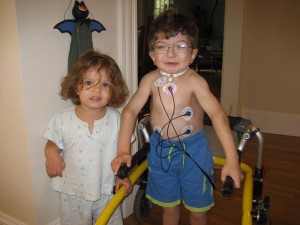Charlotte’s first foray into the land of Wellesley Little League has recently ended, and I think Ben is glad. We went to a lot of Sunday afternoon t-ball games this Spring, and we experienced excitement like a wasp’s nest in a tree above our head that made us run for our lives. Ben put the ZOOM on his wheelchair and was past right field before I knew it!
After one game, an adorable, chatty boy from the other team came up to Ben, Charlotte and me, started talking to Ben and Charlotte, but then whispered to me, “I feel bad for him”. Although I was hot and tired and wanted so badly to go home, or better yet, get our favorite Truly Yogurt treat (!), these are the moments that must be seized. I know that how I handle these situations will impact this young lad’s life and how he approaches others with disabilities in the future. What pressure! I feel like I’m up to bat.
So I bent down, started talking to our new friend, and explained that there was no reason to feel bad, because Ben is very happy–he participates in lots of different activities, does well in school and has lots of friends. He and Ben started talking directly to each other, the young boy asked questions about the wheelchair, Ben answered them, and any potential awkwardness was diverted. His mother came up to me and apologized for the numerous questions her son had asked, but I assured her that it was all good, and I thanked her for letting her son ask these questions. When in doubt, always ask!
A long time ago in a restaurant, another child wanted to ask a question and his mom didn’t let him. Ben was wearing full leg twister cable braces at the time, and this kid had questions. Who wouldn’t? I didn’t interfere between the boy and his mom, but I’ve never stopped thinking about that, and I wish I would have. Ever since then, if I sense this kind of tension, I go up to both parent and child and say, “it’s okay to have questions, what do you want to know?” and we take it from there.
Sometimes it is hard to be this patient and forthcoming. Sometimes we just want to go to a ball game or restaurant and not be noticed. A friend whose son with cerebral palsy was 20 years old, finally had enough of this, and once said to a woman, “Would you be willing to tell everyone your medical history?” when she had politely, but in his view, inappropriately, asked about his son. I hope I don’t get to that stage. I hope Ben doesn’t either. Lately, when I am explaining things to adults, Ben has started interjecting with “Mom, that’s personal!” with a new, pre-teen like attitude. But he doesn’t do this when I’m talking to kids, because I think he also knows that these conversations are important.
I’ve always felt that if we try to stop kids’ natural curiosity, the messages they receive will only tell them that they are doing something wrong, or that the person they are curious about has something wrong with them, and that they should stay away, or worse, be afraid. This couldn’t be farther from my goals. Since it is a lot harder to change adults’ attitudes, I want to focus on kids. I want kids to know, appreciate and understand the full diversity of life. If your kids ever have questions, about Ben or anyone else, trust that they will know how to ask these questions, and please let them. It’s better for all of us.


3 Comments
Andrea Ghose posted on June 24, 2012 at 4:45 pm
Thank you Rani, for sharing this conversation with the inquisitive youngster. I once had a student in my 5th grade class with spina bifida, and I admired the openness of the student, his parents, and his classmates too.
Love, Mom
deidra posted on March 17, 2013 at 9:09 am
You never cease to amaze me,
Rani.
deidra posted on March 17, 2013 at 9:09 am
Nor does Ben.